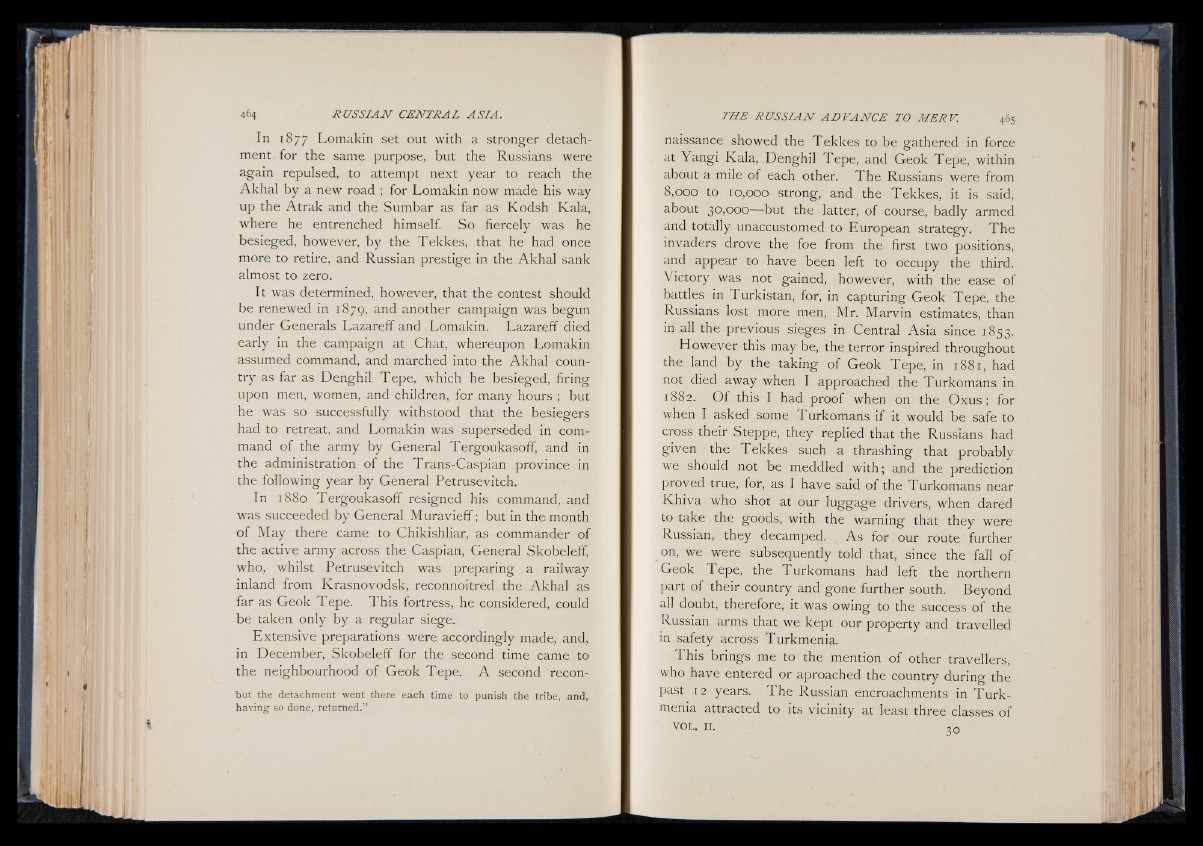
In 1877 Lomakin set out with a stronger detachment
for the same purpose, but the Russians were
again repulsed, to attempt next year to reach the
Akhal by a new road ; for Lomakin now made his way
up the Atrak and the Sumbar as far as Kodsh Kala,
where he entrenched himself. So fiercely was he
besieged, however, by the Tekkes, that he had once
more to retire, and Russian prestige in the Akhal sank
almost to zero.
It was determined, however, that the contest should
be renewed in 1879, and another campaign was begun
under Generals Lazareff and Lomakin. Lazareff died
early in the campaign at Chat, whereupon Lomakin
assumed command, and marched into the Akhal country
as far as Denghil Tepe, which he besieged, firing
upon men, women, and children, for many hours ; but
he was so successfully withstood that the besiegers
had to retreat, and Lomakin was superseded in command
o f the army by General Tergoukasoff, and in
the administration of the Trans-Caspian province in
the following year by General Petrusevitch.
In 1880 Tergoukasoff resigned his command, and
was succeeded by General Muravieff; but in the month
of May there came to Chikishliar, as commander of
the active army across the Caspian, General Skobeleff,
who, whilst Petrusevitch was preparing a railway
inland from Krasnovodsk, reconnoitred the Akhal as
far as Geok Tepe. This fortress, he considered, could
be taken only by a regular siege.
Extensive preparations were accordingly made, and,
in December, Skobeleff for the second time came to
the neighbourhood of Geok Tepe. A second reconbut
the detachment went there each time to punish the tribe, and,
having so done, returned.”
naissance showed the Tekkes to be gathered in force
at Yangi Kala, Denghil Tepe, and Geok Tepe, within
about a mile of each other. The Russians were from
8,000 to 10,000 strong, and the Tekkes, it is said,
about 30,000—-but the latter, of course, badly armed
and totally unaccustomed to European strategy. The
invaders drove the foe from the first two positions,
and appear to have been left to occupy the third.
Victory was not gained, however, with the ease of
battles in Turkistan, for, in capturing Geok Tepe, the
Russians lost more men, Mr. Marvin estimates, than
in all the previous sieges in Central Asia since 1853.
However this may be, the terror inspired throughout
the land by the taking of Geok Tepe, in 1881, had
not died away when I approached the Turkomans in
1882. O f this I had proof when on the Oxus ; for
when I asked some Turkomans if it would be safe to
cross their Steppe, they replied that the Russians had
given the Tekkes such a thrashing that probably
we should not be meddled with; and the prediction
proved true, for, as I have said of the Turkomans near
Khiva who shot at our luggage drivers, when dared
to take the goods, with the warning that they were
Russian, they decamped. As for our route further
on;, we were subsequently told that, since the fall of
Geok Tepe, the Turkomans had left the northern
part of their country and gone further south. Beyond
all doubt, therefore, it was owing to the success of the
Russian arms that we kept our property and travelled
in safety across Turkmenia.
This brings me to the mention of other travellers,
who have entered or aproached the country during the
past 12 years. The Russian encroachments in T urkmenia
attracted to its vicinity at least three classes of
VOL, II, 20